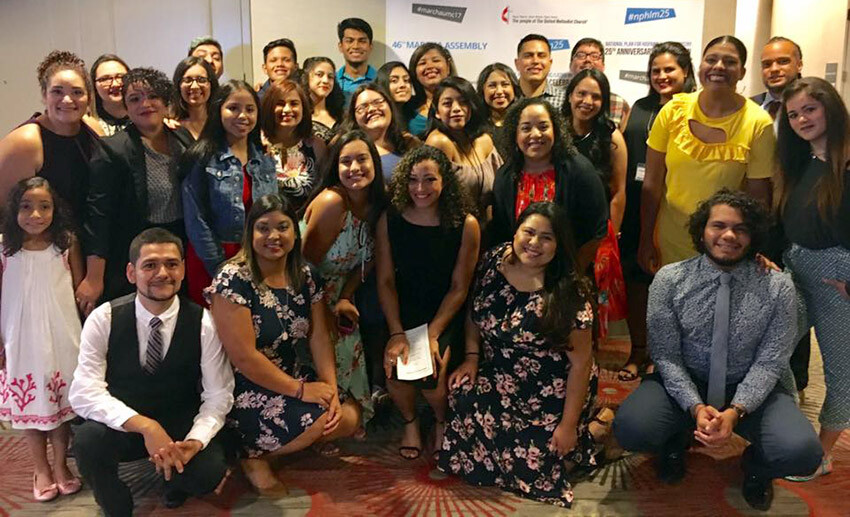Hispanic/Latinos meet for worship, stories and strategy
By Linda Worthington
UMConnection Staff
A song based on Psalm 1:3a
May this church be like a tree, behind your house, there in your garden.
A meeting place for joy, and feast, and simple prayer beneath its branches.
With its roots in
May this church bear fruits of justice, acts of loving and compassion.
Tree ever growing by living water, running eternal, flowing from God.
By Pablo Sosa from Argentina
Ten members of the Baltimore-Washington Conference area and staff attended the 46th assembly of Methodists Associated Representing the Cause of Hispanic/Latino Americans, or MARCHA, the denomination’s Hispanic/Latino caucus, held in Dallas Aug. 10-13. About a quarter of the attendees were youth or young adults, including Paola Ferro, a student at Wesley Theological Seminary.

The annual gathering, which drew more than 325 people, gives United Methodist Hispanic/Latinos from across the country an opportunity to share their views and experiences, to network and to learn.
The theme this year was “Rooted in Hope,” based on Psalm 1:3a, said the Rev. Edgardo Rivera, superintendent of the Frederick District. They composed a song based on the verse and sang it
Opening the event was Bishop LaTrelle Easterling, who challenged United Methodists to self-reflection and new action.
“We lived through the days of slavery, we lived through the days of Jim Crow, we lived through the days of lynching, both of African-Americans and people of Mexican descent,” she said.
It was a particularly poignant remark. Meeting at the other end of the hotel was the executive committee of Black Americans for Church Renewal, who attended the opening and closing services together. The Rev. Tony Love, as well as being the bishop’s special assistant, represented the BWC for BMCR.
Emma Escobar, the conference coordinator for Hispanic ministries, said one of the things that she appreciated most was the meetings with BMCR. “So many years we talked about intersectionality and the need to partner/work with our black brothers and sisters,” Escobar said. “This time it was a reality!”
Rivera agreed.
“The goal is to find common spaces where we can come together and support one another as we all strive for our United Methodist Church to be more representative of our communities,” he said.
MARCHA always attracts several bishops, including the Rev. Minerva Carcano, the first Latina bishop in the denomination, who serves the California-Nevada Conference. Nine other bishops, both active and retired, attended and served Communion together.
Unity in the church was a big topic and “the rest of the church could take notice,” said Bishop Sally Dyck of the Chicago area. She mentioned that one of the Northern Illinois Conference’s churches had congregants from 10 Spanish-speaking nations.
Twenty-five years ago, Hispanics in the U.S. numbered about 22 million and were 10 percent of the population. Now they’re about 57 million or nearly 20 percent, noted Mark Hugo Lopez, a demographer of the Pew Research Center.
Thomas Kemper, the top executive of The United Methodist Board of Global Ministries, praised the work of the National Plan for Hispanic/Latino Ministries, which celebrated its 25th anniversary during the event. But, speaking to Lopez’s figures, “Over 50 million people in this country are of Hispanic/Latino descent, and in our church (the UMC), we only have 1 percent Hispanic/Latino,” he said. “Something’s wrong in that picture.”
Workshops during the MARCHA meeting included community organizing,
President Donald Trump and his approach to immigration enforcement gave speakers and listeners plenty to talk about. Surveys indicate that Hispanic/Latinos are now somewhat less optimistic about their prospects in the U.S. The Trump factor also contributed to discussions about sanctuary churches.
“It (the Trump rhetoric) has opened the doors to many hostile expressions against all Hispanics, not just the undocumented, not just the refugees,” said retired Bishop Elias Galvan, executive director of MARCHA. “It’s something that needs to be denounced.”
“The question I want to raise is, beyond this day, what do you do?” asked Bishop Easterling.
Bishop Carcano perhaps had the challenge in mind when she said, “We need to consider how we will be the church among and with the poor,” she said. “We need to reconsider our very expensive models of local church ministry … and how we equip or do not equip persons to share the good news of Jesus Christ.”
Pablo Alvarado, leader of the National Day Laborer Organizing Network, answered in another way. He made a case that the church should not only be in support centers for day
Many in a workshop discussed possibilities for being sanctuary churches, not just by housing an undocumented immigrant, which few can do, but by being a “solidarity congregation,” he said. “In solidarity” can take many faces: through volunteers, offerings, meals, as a backup when necessary, members accompanying an undocumented worker to her ICE check-in, raising funds for legal services – all were suggestions.
The theme song caused us to reflect on the role of the church, Rivera said, “comparing it to a tree, rooted in God’s hope, which allows for welcoming safe places for all people, bearing fruits of justice, love and compassion.”
Information for this story was provided in part by Sam Hodges of United Methodist News Service.
